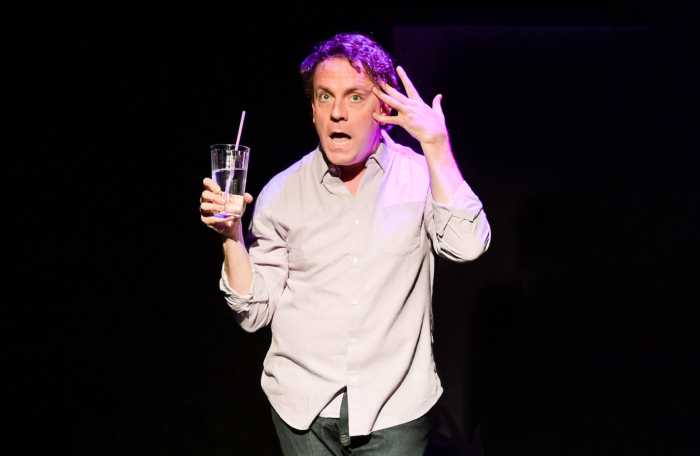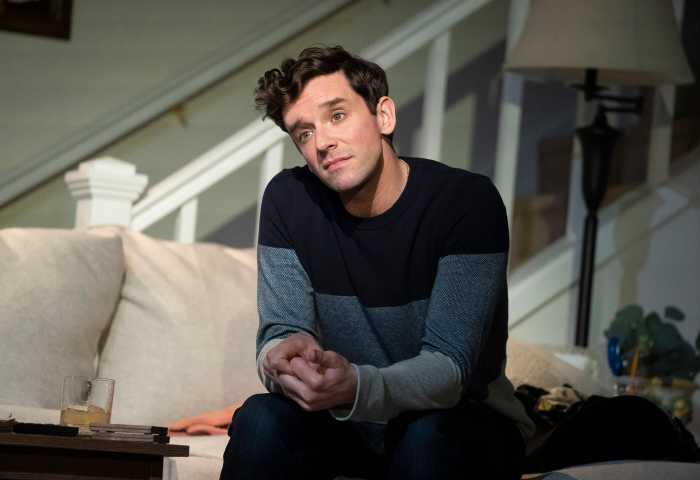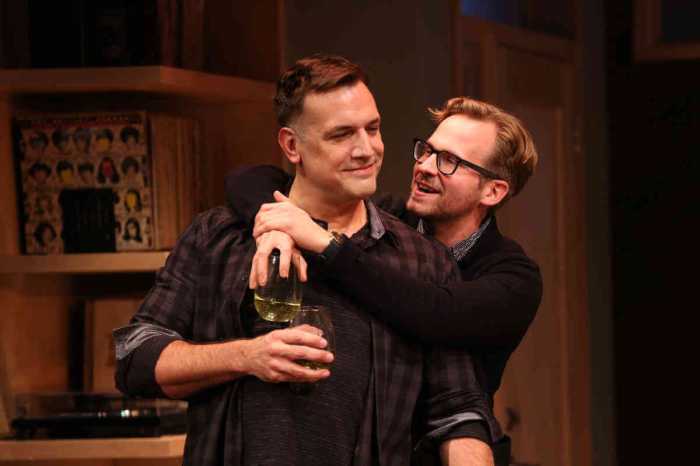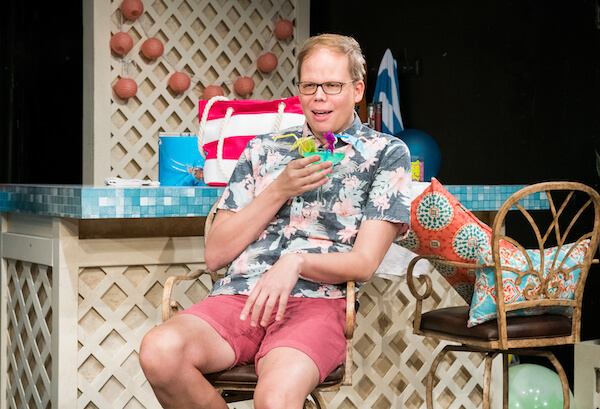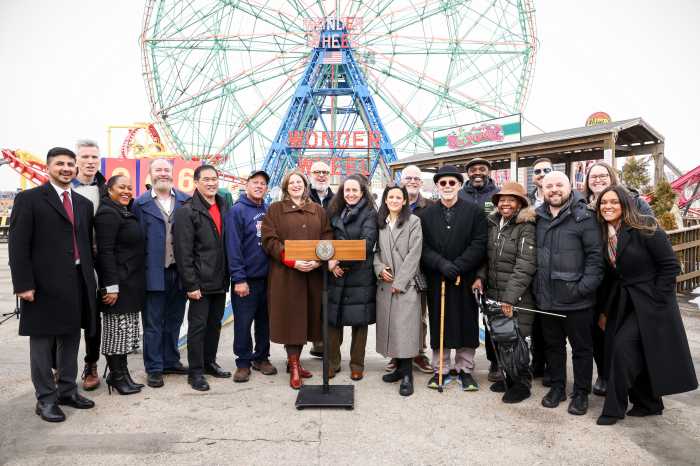Ward Horton, Jack DiFalco, Michael Urie, and Mercedes Ruehl in Harvey Fierstein's “Torch Song,” directed by Moisés Kaufman at the Second Stage through December 3. | JOAN MARCUS
The spate of first-time revivals of groundbreaking gay-themed shows continues. In recent seasons, “The Normal Heart,” “Lips Together, Teeth Apart,” and “Falsettos” have all returned to major New York stages with varying degrees of success. This season, “M. Butterfly” is back on Broadway for the first time, and “Angels in America” is slated to return next spring.
Also back on the boards, courtesy of Second Stage Theater, is Harvey Fierstein’s fiercely comic “Torch Song Trilogy,” now simply called “Torch Song,” which nabbed the 1983 Tony Award for Best Play and Best Actor Award for Fierstein. This legendary drama, about a campy gay man longing for acceptance, was born as separate one-acts in the basement of La MaMa, and later featured Matthew Broderick and Estelle Getty. Michael Urie now takes on the iconic lead role of Arnold Beckoff, originated by Fierstein.
Some two or three decades after their premieres, one question looms over each of these cultural landmarks: Is the show still trenchant or has it gone trite?
In the case of “Torch Song,” this deeply satisfying work not only retains its rich, emotional power, it has acquired a fresh urgency.
Michael Urie as a willful gay man yearning for love and acceptance
Fierstein himself retooled the text for this version. Much of the fat has been trimmed, slashing the running time from four hours to a relatively brisk two and one-half hours, rendering the show more muscular and focused.
The three discrete chapters are truncated but still form a cohesive whole. “International Stud, 1971,” named for an actual sleazy gay bar on Perry Street in the West Village, finds Arnold donning drag and makeup for his turn as the alluring Virginia Ham. Things look promising when he takes up with the strapping albeit conflicted bisexual Ed (an excellent Ward Horton), but the romance gets too complicated and they move it to the friend zone. Or so they think.
Arnold is outraged at Ed’s insistence on dating women and offers up keen insights. “How can sleeping with a woman make you comfortable if you know you’d rather be with a man?,” he asks incredulously. “How are you supposed to get respect from anyone if you won’t be yourself? There’s no you to respect.”
The backroom scene where the reluctant Arnold gets, um, manhandled is as deliriously astounding as when I saw it more than 30 years ago.
Roxanna Hope Radja, Ward Horton, Michael Urie, and Michael Rosen in “Torch Song.” | JOAN MARCUS
The second chapter, “Fugue in a Nursery, 1975,” depicts Arnold and his young new lover, Alan (Michael Rosen), visiting Ed and his incredibly open-minded wife Laurel (the highly appealing Roxanna Hope Radja, who makes the most of her brief stage time) at their farmhouse upstate. The entire chapter takes place in an oversized bed where the couples swap places and chat about their romantic entanglements. When Ed gets paired off with the model/ ex-hustler Alan, who, by the way, cavorts in bulging briefs, more than just chatter erupts.
The most affecting chapter is “Widows and Children First, 1980,” where Arnold’s stern, disapproving mother (Mercedes Ruehl) visits his Manhattan apartment (David Zinn designed the efficient, period-perfect sets), only to discover he is fostering a teenage boy, David (Jack DiFalco), a punk rescued from the streets. Tragically, Alan has died at age 23; Arnold is doing his best to provide David a nurturing home. Separated from Laurel, Ed is crashing on the foldout sofa. Clearly he and Arnold have some unfinished business to sort out.
The über-talented Urie would seem an ideal fit as Arnold. The irresistibly charming actor has received well-earned kudos for a range of roles, from the scheming assistant in “Ugly Betty” to the lonely clerk channeling Barbra Streisand in “Buyer & Cellar” to the bumbling dolt in “The Government Inspector.”
But under the direction of Moisés Kaufman (“The Laramie Project”), his lilting, croaking New Yawk Jewish accent and affectations are so mannered, especially compared to the supporting cast, that he can come off as artificial. Is he trying to channel the inimitable Fierstien?
Not that it spoils the overall performance. Urie’s comic timing is impeccable, and he meets the physical challenges of the role with whimsy and gusto. Delivering a gripping turn that still manages to tug at the heartstrings, his Arnold is moody and mooning, wondering why he can’t find a healthy relationship like his straight peers are able to have.
The powerhouse Ruehl is superb as Arnold’s meddlesome mother who cannot accept her son’s “sickness” that he’s “chosen for himself.” Essentially a villain, she manages to muster a level of tenderness that earns our empathy instead of ire.
What’s especially striking about this revival is discovering the extraordinary prescience of Fierstein. When he wrote the play, homosexual relations were illegal in many states and gays were routinely vilified, beaten, even murdered. Yet he envisioned a world where gays would be accepted in mainstream society, be open and honest with friends and family, with options for marriage and adoption. He showed everybody that one day these dreams could become a reality.
The timing for a revival is ideal. Only a year ago, “Torch Song” might not have had the same cultural resonance, with many of the coming-out issues registering as a thing of the past. But under the current homophobic — no, make that homo-vitriolic — regime in the White House, the right to marry your same-sex partner, adopt children, and live a life free from discrimination cannot be taken for granted.
TORCH SONG | Second Stage Theater, Tony Kaiser Theater, 305 W. 43rd St. | Through Dec. 3: Tue., Thu. at 7 p.m.; Wed. at 7:30 p.m.; Fri.-Sat. at 8 p.m.; Wed., Sat. at 2 p.m.; Sun. at 3 p.m.; some schedule variation | $99-$139 at 2st.com or 212-246-4422 | Two hrs. and 30 mins., with intermission




